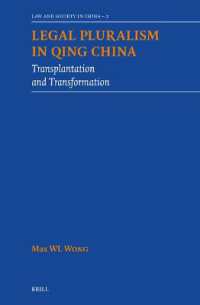- ホーム
- > 洋書
- > 英文書
- > Science / Mathematics
基本説明
Feenberg examines different aspects of the tangled relationship between technology and society from the perspective of critical theory of technology.
Full Description
A leading philosopher of technology calls for the democratic coordination of technical rationality with everyday experience.The technologies, markets, and administrations of today's knowledge society are in crisis. We face recurring disasters in every domain: climate change, energy shortages, economic meltdown. The system is broken, despite everything the technocrats claim to know about science, technology, and economics. These problems are exacerbated by the fact that today powerful technologies have unforeseen effects that disrupt everyday life; the new masters of technology are not restrained by the lessons of experience, and accelerate change to the point where society is in constant turmoil. In Between Reason and Experience, leading philosopher of technology Andrew Feenberg makes a case for the interdependence of reason-scientific knowledge, technical rationality-and experience. Feenberg examines different aspects of the tangled relationship between technology and society from the perspective of critical theory of technology, an approach he has pioneered over the past twenty years. Feenberg points to two examples of democratic interventions into technology: the Internet (in which user initiative has influenced design) and the environmental movement (in which science coordinates with protest and policy). He examines methodological applications of critical theory of technology to the case of the French Minitel computing network and to the relationship between national culture and technology in Japan. Finally, Feenberg considers the philosophies of technology of Heidegger, Habermas, Latour, and Marcuse. The gradual extension of democracy into the technical sphere, Feenberg argues, is one of the great political transformations of our time.








